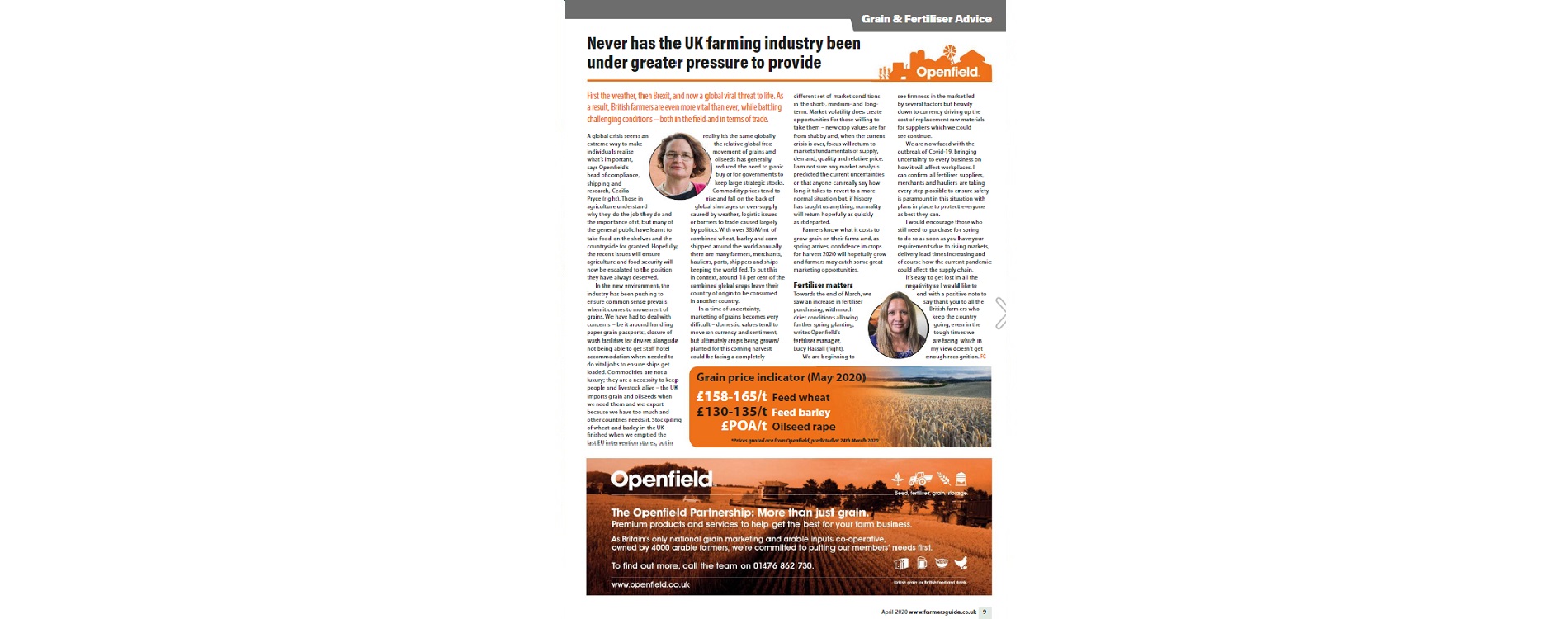Never has the UK farming industry been under greater pressure to provide
Openfield’s Grain & Fertiliser update, featured in April’s Farmers Guide Magazine.
First the weather, then Brexit, and now a global viral threat to life. As a result, British farmers are even more vital than ever, while battling challenging conditions – both in the field and in terms of trade.
A global crisis seems an extreme way to make individuals realise what’s important, says Openfield’s
head of compliance, shipping and research, Cecilia Pryce. Those in agriculture understand why they do the job they do and the importance of it, but many of the general public have learnt to take food on the shelves and the countryside for granted. Hopefully, the recent issues will ensure agriculture and food security will now be escalated to the position they have always deserved.
In the new environment, the industry has been pushing to ensure common sense prevails when it comes to movement of grains. We have had to deal with concerns – be it around handling paper grain passports, closure of wash facilities for drivers alongside not being able to get staff hotel accommodation when needed to do vital jobs to ensure ships get loaded. Commodities are not a luxury; they are a necessity to keep people and livestock alive – the UK imports grain and oilseeds when we need them and we export because we have too much and other countries needs it.
Stockpiling of wheat and barley in the UK finished when we emptied the last EU intervention stores, but in reality it’s the same globally – the relative global free movement of grains and oilseeds has generally reduced the need to panic buy or for governments to keep large strategic stocks.
Commodity prices tend to rise and fall on the back of global shortages or over-supply caused by weather, logistic issues or barriers to trade caused largely by politics. With over 385M/mt of combined wheat, barley and corn shipped around the world annually there are many farmers, merchants, hauliers, ports, shippers and ships keeping the world fed. To put this in context, around 18 per cent of the combined global crops leave their country of origin to be consumed in another country.
In a time of uncertainty, marketing of grains becomes very difficult – domestic values tend to move on currency and sentiment, but ultimately crops being grown/planted for this coming harvest could be facing a completely different set of market conditions
in the short-, medium- and longterm. Market volatility does create opportunities for those willing to take them – new crop values are far from shabby and, when the current crisis is over, focus will return to markets fundamentals of supply, demand, quality and relative price.
I am not sure any market analysis predicted the current uncertainties or that anyone can really say how long it takes to revert to a more normal situation but, if history has taught us anything, normality will return hopefully as quickly as it departed.
Farmers know what it costs to grow grain on their farms and, as spring arrives, confidence in cropsfor harvest 2020 will hopefully grow and farmers may catch some great marketing opportunities.
Fertiliser matters
Towards the end of March, we saw an increase in fertiliser purchasing, with much drier conditions allowing further spring planting, writes Openfield’s fertiliser manager, Lucy Hassall. We are beginning to see firmness in the market led by several factors but heavily down to currency driving up the cost of replacement raw materials for suppliers which we could see continue.
We are now faced with the outbreak of Covid-19, bringing uncertainty to every business on how it will affect workplaces. I can confirm all fertiliser suppliers, merchants and hauliers are taking every step possible to ensure safety is paramount in this situation with plans in place to protect everyone as best they can. I would encourage those who still need to purchase for spring to do so as soon as you have your requirements due to rising markets, delivery lead times increasing and of course how the current pandemic could affect the supply chain. It’s easy to get lost in all the negativity so I would like to end with a positive note to say thank you to all the British farmers who keep the country going, even in the tough times we are facing which in my view doesn’t get enough recognition.




